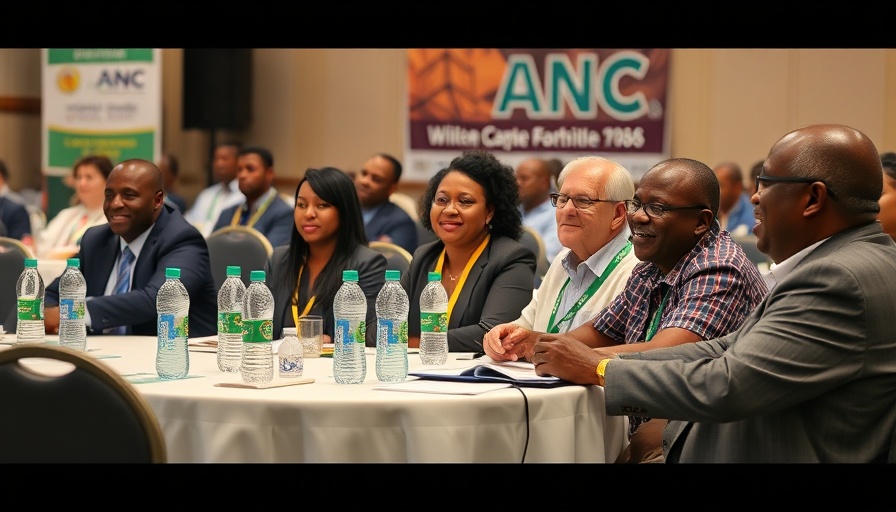
ANC Reassesses Free State Leadership Amid Electoral Challenges
As the African National Congress (ANC) gears up for a crucial Provincial Executive Committee (PEC) meeting, its National Working Committee (NWC) has engaged with various structures within the Free State. This critical visit, spearheaded by ANC president Cyril Ramaphosa, aims to strategize the party’s renewal efforts heading into the 2026 local government elections. The backdrop of this renewed engagement comes after the ANC faced a significant electoral decline in the 2024 elections, prompting a deep introspection within its ranks.
Strengthening Organizational Structures for Better Governance
During a series of interactions held over the weekend, NWC members focused on reinforcing party structures across regions such as Mangaung and Xhariep. According to ANC spokesperson Mahlengi Bhengu-Motsiri, the primary goal of this initiative is to bolster governance and service delivery in local municipalities, addressing the valid concerns raised by constituents across the province.
Bhengu-Motsiri emphasized that the ANC's mission is to ensure that governance mechanisms are functioning optimally, particularly in the Mangaung Metropolitan Municipality, which has faced scrutiny for its underwhelming service delivery. "Difficult decisions" may be necessary to correct past governance missteps, an acknowledgment that the party remains focused on addressing local needs ahead of the imminent elections.
Addressing Leadership Speculations in the Free State
With increasing speculation about possible leadership changes within the Free State, the ANC has been quick to dismiss such claims. Dr. Gwen Ramokgopa, the ANC treasurer general, reaffirmed the party's confidence in the existing PEC, which includes Mxolisi Dukwana as chairperson. She reiterated that the party’s intent is clarification and engagement rather than upheaval.
This strategic engagement is also seen against the backdrop of the 2026 municipal elections, which are critical for the ANC to reclaim its standing after a slight dip in voter turnout. Maintaining a lead in the province is essential, especially when considering the overall electoral landscape affected by opposition parties such as the Democratic Alliance (DA) and the Economic Freedom Fighters (EFF).
Anticipating the Political Landscape Ahead
The party’s current efforts reflect a long-term strategy toward political realignment, which becomes increasingly relevant in the discussions leading up to the elections. In the context of coalition government challenges, the ANC must present a unified front to counteract the efforts of opposition figures like John Steenhuisen and Julius Malema.
As Ramaphosa leads this renewal project, it signifies not only a response to past failures but also an opportunity to reinvigorate the ANC’s commitment to mitigating public dissatisfaction regarding service delivery and governance.
The Bigger Picture: Unity and Cohesion in the ANC
The importance of this visit lies beyond mere reconfiguration; it reflects a more profound need for the ANC to unify its members and clarify its stance on pertinent issues such as land reform and the party’s role in implementing constitutional amendments. The notion of land expropriation without compensation and its implications for economic policy also surfaced during discussions, highlighting the ANC’s intention to stay responsive to public sentiment.
This commitment toward community engagement and service enhancement serves as an impetus for rebuilding trust in their leadership, a decisive element that could pivot the ANC’s fortunes in the upcoming electoral battles. While the concerns about internal divisions linger, the party’s ability to address these tension points head-on will determine its efficacy in restoring confidence within the electorate.
Conclusion: A Call for Increased Civic Engagement
As political dynamics in South Africa evolve, the need for engaged citizenship becomes increasingly vital. The ANC’s latest endeavors represents an opportunity for constituents to push for transparency, demand better governance, and hold leaders accountable. This heightened engagement can foster a more responsive and effective government, aligning with the aspirations of the electorate. For professionals and politically-minded citizens alike, being informed and involved can equip them with the necessary insights to advocate for their rights and needs during this pivotal moment.
 Add Row
Add Row  Add
Add 




Write A Comment